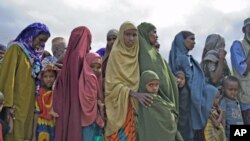The UN refugee agency is expressing alarm at a dramatic rise in the number of new refugee arrivals from Somalia into Kenya. The UN refugee agency [UNHCR] reports more than 20,000 Somali refugees have arrived in the Dadaab refugee complex in northern Kenya over the past two weeks.
The new arrivals are mostly farmers and animal herders from Lower Juba and the city of Dhobley. The UNHCR said last year, between 6,000 and 8,000 Somalis on average arrived in Kenya’s Dadaab camp every month. This year, the monthly average has risen to 10,000.
The UNHCR said even this record is now being broken, with twice that number having been reached in just two weeks. Spokeswoman Melissa Fleming said it is not just the numbers that are shocking. It also is the terrible condition of the people when they arrive in Kenya that is shocking.
“There is a horrible drought in Somalia. As if these people were not suffering enough from the violence," she said. "And this is causing a horrible phenomenon of malnutrition. So, when these people arrive, they have walked for days exhausted and they have not eaten or had anything to drink.”
Fleming said the UNHCR is doing its best to help in this crisis. But, she noted that it is difficult to provide aid in a systematic and proper way when people are not living in a camp. She said Kenya’s Dadaab refugee camp is overcrowded. Therefore, more than 50,000 refugees, including the newly arrived 20,000, currently are living in makeshift shelters outside the structured camp.
The Dadaab refugee complex is the largest refugee settlement in the world. It was established in 1991 and 1992 following the collapse of the Siad Barre government in Somalia. The camp, which was designed to shelter some 90,000 refugees, is now home to more than 360,000 refugees.
Fleming said the UNHCR and its partners are providing tents, latrines and water. She said many of the refugees continue to have very limited access to basic humanitarian services and need to walk for long distances to receive assistance.
“They are able to receive the basic nutritional aid, basic medical aid," she said. "However, the conditions are not great - the living conditions. And this can fuel continued health problems. So we are very concerned.”
Fleming said the UNHCR is grateful to the Kenyan government for keeping its borders open to the refugees. She said the agency has established a new site in the Dadaab refugee complex.
She said the refugee situation will ease once the government allows the UNHCR to move the more than 50,000 newly arrived Somali refugees into the site.
Thousands of Somalis Flee to Kenya to Escape Conflict, Drought
- By Lisa Schlein




